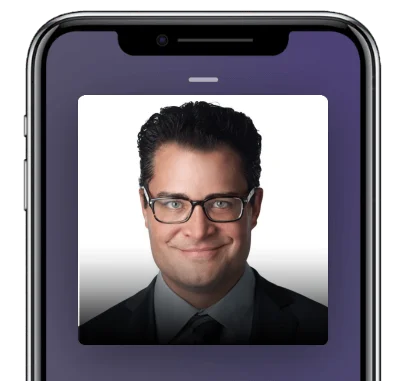In this Episode
- [01:54]What should listeners know about self defense? We learn about having an action plan in place before you find yourself in the situation.
- [02:58]David gives some key tips on how to stay safe in public.
- [04:24]We hear about David’s personal experience with having needed to use pepper spray to get to safety.
- [05:48]Antisocial and asocial people can pose different kinds of threats, but David points out the difficulty of figuring that out in a dangerous situation with a complete stranger.
- [06:32]What are some techniques to use to create physical distance if someone has already invaded your space? Do you practice your plan? David answers, and gives further insight into how to keep yourself safe.
- [09:01]David recommends pepper spray and pepper gel as things to have with you, because you can use them to protect yourself at a distance instead of engaging hands-on with an attacker. Alarms can also be helpful because they call attention to the situation.
- [10:39]One of the benefits of pepper spray is that you’re justified in using it if you can later articulate that you felt unsafe or threatened in the situation (which of course is different from lethal force).
- [11:17]David tells us more about the effects of pepper spray, as well as its benefits.
- [14:10]It’s worth looking into local self-defense classes. David recommends Krav Maga, a system based on Israeli Defense Forces training. He also talks about the value of learning to defend yourself, and describes his own SABRE Personal Safety Academy class.
- [16:57]We learn more about the techniques involved in using pepper spray well.
- [18:23]David describes some parts of the body to go for if you’re forced into hand-to-hand combat.
- [20:03]How do you recognize someone who might be intending to attack you? The answer is mostly to listen to your instincts.
- [22:32]David’s most highly recommended book is The Gift of Fear, but he also suggests College Safety 101. He also recommends Guard Llama, which is a small device you can carry with you that lets the company contact the police on your behalf.
- [24:58]Thanks to the number of property crimes committed daily, David also suggests having a home security system in place. He goes on to give some specific suggestions for keeping your home safe, like not having shrubs or hedges that block the view of your doors or windows.
- [29:20]David advises caution when someone comes to your door without a scheduled meeting. Don’t let people inside even if they claim to be from a utility company, for example.
- [30:16]We hear about the value of getting to know your neighbors and forming a sense of community and possibly a neighborhood watch group.
- [32:41]David lists some online scams and social engineering tactics that we should all be on the lookout for. He and Stephan talk a bit about the IRS phone scams that have been going around.
- [35:12]Stephan’s aunt was the victim of an email scam, and ended up losing several thousand dollars. In the ensuing exchange, we learn how important it is to fight with everything you have not to be taken away in a kidnapping, because if you get taken away you’re more likely to end up dead.
- [37:53]What should you do if you end up being put in the trunk of a car?
- [40:14]To see David’s safety videos, you can visit personalsafetyexpert.com.
Welcome David, it’s great to have you.
Thanks, Stephan, it’s great to be here.
Let’s start with self-defense. What should our listeners know about self-defense?
A lot of that comes with just being prepared, having a plan, visualizing yourself in a dangerous situation, and having a plan of action to escape that situation. It can be quite simple to do but the biggest thing is realizing that the situation can occur, it does occur daily. There are 15,000 violent crimes that occur a day in the United States. There are over 800 sexual assaults that occur with women in the United States per day. It’s a very serious issue, absolutely could happen to you but you lessen your chances when you make yourself a hard target which means you are present and in what you are doing, you’re engaged when you are commuting, when you’re leaving your car and entering your home, making yourself a hard target, having that presence, that awareness, that confidence goes a long way towards stopping an attack from occurring to begin with.
There are some things that you can do to prepare. I’ve read articles online about women, you don’t wanna have your hair in a ponytail, you don’t wanna be looking down at your phone as you’re walking down the street. What are some of the key tips that you want our listeners to know?
One of the big things that we talked about in my program, the SABRE Personal Safety Academy in our class, is to be aware of distraction techniques. You’re safe at a distance, you wanna keep a distance from strangers. We actually recommend when possible on the street to keep at least 12 feet or beyond so they have to take two steps, two and a half steps and then lunge towards you to get you because, in your action, their actions are always gonna be faster than your reaction so you wanna keep at least that 12-foot distance when possible. Obviously, when there are other people in the street around you, that’s not possible, but the chance of attack to occur in those situations are significantly reduced. You’re more likely to be the target when you are alone. But people try to close that gap, they try to get closer to you and they do that by asking you questions. Most people are innately good, we want to help people out when they ask for help. Some of the questions are, “What time is it?” “Do you know how to get to so and so?” What often happens then is people, because we all carry smartphones, you pull out your phone, you look down on it, next thing you know they’re either taking your phone, robbing you or trying to kidnap you. It’s okay to be rude in those situations, it’s okay to be in a hurry but you wanna keep that distance from strangers at all times. Go into any request from a stranger when you are alone with a little skepticism and trying to keep that distance.
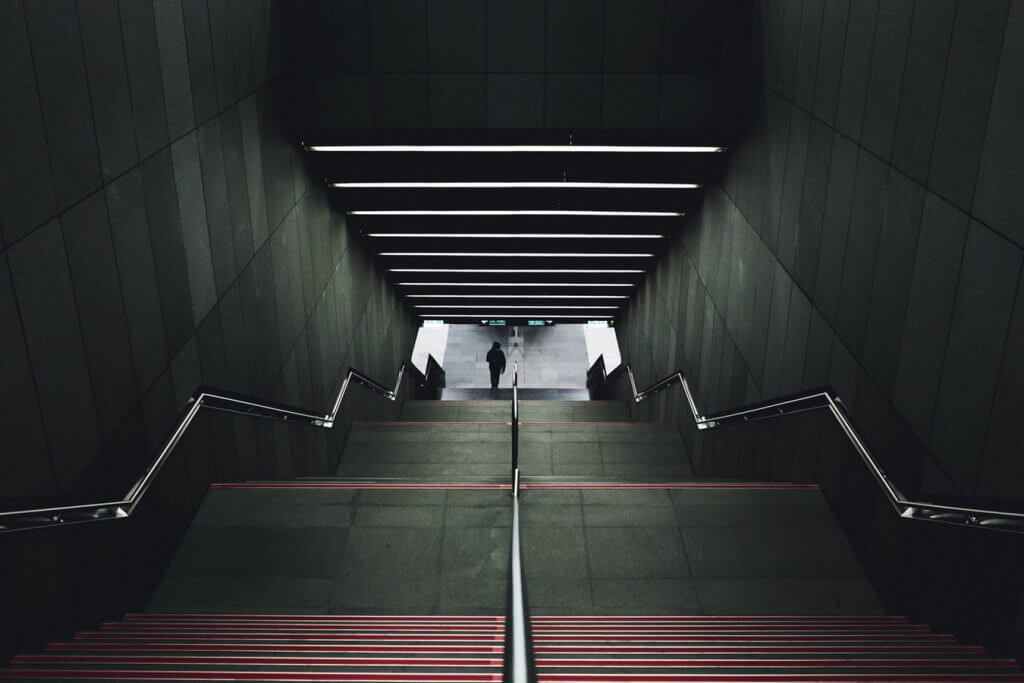
Right. Have you ever had this kind of situation where you were mugged or was an attempted mugging or you were attempted to be kidnapped or anything like that?
I had a situation, this is actually back when I was in college, I was at a big festival for July 1st ball at St. Louis and it was in the parking lot after. There was an individual who just, a grown man who became very argumentative and hostile towards a member in our group. What I attempted to do was just to take distance from this individual and he just kept on coming at us, wouldn’t let us leave, something about being angry about where we parked and being parked close to his car. I don’t know if the individual consumed a lot of alcohol or just was enraged to just something else that happened that day but he started swinging at one of my friends and I actually happened to have pepper spray with me at the time because it was a big large event wherein you know, things like that can happen. I used pepper spray, the individual backed off and we got in our car and drove away to safety.
Sounds kinda scary. My understanding though is that when somebody who is coming at you or is just kinda overly aggressive, maybe they’re drunk or on drugs or something, they’re not as dangerous to somebody who is asocial, somebody who is antisocial or just kinda overly aggressive is one kind of threat but an asocial threat is a whole other kind of thing and you might end up meeting a dexter sort of situation with an asocial person. Do you have any comments on that?
When something doesn’t feel right, it probably isn’t and you wanna extract yourself from that situation. What you’re saying is relevant, it’s difficult to dissect who an individual is when they are a complete stranger and what they’re experiencing. That’s whenever you are experiencing that type of behavior, your intuition is telling you something isn’t right, just to do is to escape, absolutely that should be your first priority is your own personal safety. Put as much distance between you and that individual as quickly as you possibly can.
Right, so how do you that? What are some of the techniques to maintain that distance or to create that distance if somebody’s already invaded your space?
When something doesn’t feel right, it probably isn’t and you wanna extract yourself from that situation.
I think that first there’s flight, fight or freeze. Freeze is the last thing that you wanna do. It goes back to what I said initially is that visualization, envisioning yourself being in a scenario, in a parking lot, going into your home, being in a crowded area, going to your car on a Friday or Saturday night or from an event, and engaging someone that is acting dangerous towards your safety, hostile and having a plan which would be escaping immediately. When you do that, you already acted this out, therefore you’re less likely to freeze. You wanna put distance between yourself and them. Go into a building, go to a place where there’s a lot of other people so whether that’s a store back to the venue that you are in. If you feel uncomfortable leaving that venue, ask for security to accompany you or someone else. There’s always safety in numbers, there’s a number of things that you can do but there is such thing as a golden rule to escape and attack. In every situation, in every scene, it’s going to be different but just having a plan, having it played out in your head will go a long way towards allowing you the opportunity to escape.
Do you practice this plan, and if so, how often?
I don’t have a set rule regarding that. I think it’s just always you practice it every time you go outside, you practice it every time you’re alone, you always wanna have that presence. People like to summarize self-defense and just say, “Be aware of your surroundings,” it’s a lot more than that. You wanna be looking out, you wanna stay in a condition yellow which is relaxed alertness. It’s a 365-degree awareness of your surroundings. As soon as you notice something uncomfortable or wrong, take action. This is something that you should always have with you. Again, one of the top concerns of Americans is their personal safety, themselves, and their families. You should always engage in this condition yellow behavior, make yourself a hard target, and ultimately have a way to protect yourself because you can do everything right, you can make yourself that hard target and an attack could still ensue because it could be someone that’s emotionally disturbed. Even though you are a hard target, you’re a more challenging task for them to create a crime, they may still create the crime nonetheless. If you don’t have a way to protect yourself then you’re in trouble.
What sort of weapons would you recommend? I am assuming pepper spray because that’s your big product although SABRE Red does sell a lot of other personal safety devices and different things that I’m probably not even aware of. What do you recommend that you always have on you?
I definitely am a fan of pepper spray, pepper gel, products that allow you to protect yourself at a distance, a safe distance. Even the smallest keychains, SABRE products would deploy up to 10 feet, some products in small canisters go up to 20 feet. Why go hands-on with an attacker who could be bigger, faster, more skilled than you, that individual already has what’s called the attacker’s advantage, they know when the attack is going to occur before you do, they know how they’re gonna strike, where they’re gonna strike or what they’re going to do and their actions are always gonna be faster than your reactions. Keep a distance, pepper spray allows that but like you said, we do have other products from personal alarms, even stun guns. I’m hesitant to call pepper spray a weapon, we call it a personal safety product because it’s non-lethal, it’s not dangerous, it just causes short-term incapacitation. Pepper spray may not be for all. We also offer personal alarms that draw a lot of attention to you which also makes you a hard target. When that individual tries to commit that crime then they hear a piercing 120- to 130-decibel alarm that could be heard up to 1,000 feet or beyond. It’s gonna draw attention to that situation which increases the chance that that individual trying to commit that crime is going to be caught or identified so they try to retreat and you can escape to safety. Whatever you choose is best for you, know how to use it, practice with it so when you’re in that high-stress situation you can adequately defend yourself just so you can escape to safety, that’s very, very important.
Whatever personal safety devices you choose is best for you, know how to use it and practice with it so when you’re in that high-stress situation you can adequately defend yourself.
Right. Pepper spray deploys 10 feet minimum and you said that you wanna keep a distance of at least how many feet again from the potential attacker?
We always recommend 12 feet. When they come within inside that range and you feel that your safety is in jeopardy and you can articulate that afterward, you are justified to use that spray, that’s the advantage of carrying a non-lethal product. You don’t have to wait for the situation to turn to justify lethal force before you can use it, you just need to be able to articulate afterward that, “Hey, I felt my safety was in jeopardy. This individual came towards me in a threatening manner. I did not feel safe.” You deploy the pepper spray, it causes involuntary eye closure, they can’t see you, they lose their balance, you escape to safety.
How long do these effects last over the pepper spray?
The worst pain is over in about 20 minutes but typically pain can last up to 45 minutes. As soon as the product enters that ocular area of the attacker, their eyes close, they can’t keep them open, that’s the advantage of pepper spray unlike any other products that relying on pain to incapacitate. If that person is under the influence of drugs or alcohol or motion disturbed, they can’t feel pain, pepper spray is still effective. This is why the FBI, the Federal Government Police Department switched over to it from tear gas and mace type products in the late 80s, early 90s because they found out that it causes that involuntary eye closure which gave them the opportunity to move in and safely restrain the individual or an individual to use it in personal safety so they can escape.
Got it. A taser or some sort of incapacitating device that’s non-lethal is not as good as pepper spray because you have to be in closer proximity with some of these devices, right?
That’s correct with a stun gun. A stun gun, you actually have to make bodily contact with the individual while you’re holding that device. You wanna basically have contact, the neck, or the main torso of the individual. In some cases, you’re gonna have to hold that onto them for a few seconds to put them to retreat. Stun guns do rely on paint to incapacitate. They use micro columns or what’s called the charge of the stun gun to cause pain. If the individual doesn’t feel pain, a stun gun won’t give you that opportunity to escape unless they’re intimidated by the distance. They sound wild, they’re intimidating, but if you actually have to use it, you are dealing with a goal-oriented attacker, it’s not your best choice. You’re far better off with the pepper spray. The taser device is the device that’s used by police officers as well. That actually deploys at a distance. If it makes contact with the individual, then that can incapacitate them for 30 seconds. I believe there’s a civilian taser model so you don’t have to touch them with it but if you miss then you actually have to go up and do what’s called duet drive stun so you make contact again. You get that one shot but you gotta be very accurate with that shot. And then after 30 seconds, that person can recover pretty immediately so it depends upon what you feel most comfortable with. If you are looking for a product that will protect you at a distance which gives you ample shots, even our small keychain spray SABRE product deploys after 25 bursts, you can protect yourself against multiple attackers at a distance and they’re gonna feel pain like I said for 20 minutes or beyond, that gives you ample opportunity to escape that situation.
I assume that you have some recommendations on self-defense classes or something that would prepare people for a potential dangerous situation. What do you recommend?
I think there’s a lot of good classes out there. There’s a lot of good instructors. I’m hesitant to tell you just Google local self-defense classes but if that’s your only option then it’s worth looking into. You know, Krav Maga is a very popular system way to protect yourself that’s based on an Israeli defense training system, that’s why it was created, it’s very good. It just depends. Maybe contact your local law enforcement training academy and ask to speak to the Defense of Tactics Instructors and ask them for their opinion and sometimes law enforcement agencies offer that to their communities as well too. There’s a commitment there, don’t think that you can go to one class, learn a couple of ways to punch and you’re gonna be ready to protect yourself, that is not the case. When you choose to engage in hand to hand combat with an attacker, one strike to the nose and your entire world changes. You experience some intense pain, your eyes water and that’s something that’s typically not taught in a lot of these self-defense classes. Going hand to hand with an individual, that’s a whole different level of defense than it is when you can protect yourself at a distance which is what we always recommend. But I do think it’s a good idea to have a basic understanding of some personal safety, at least an idea of how to escape some holds and grips and things like that, we do teach that in my SABRE Personal Safety Academy Class.
It’s a good idea to have a basic understanding of some personal safety
How long is that class that you teach?
The basic class that we teach our Civilian Safety Awareness Program is a three-hour class, an hour and a half of that is classroom basic ideas that the psychology of personal safety and then we put you through a number of drills and techniques and put you through some drills to escape an attacker which is about another hour and a half after that. Three hours will put you through that, we have a college safety program that’s an abridged version of that which focuses on things college students face daily. It’s one of five college females that are sexually assaulted and a lot of violent crimes that occur in college campuses as well so that’s an abridged class. It takes about 90 minutes for that program.
Right, so what are some of the drills that you teach in the longer class?
We teach you how to break ribs, some sensitive areas of the body to punch, kick. How to deploy your pepper spray, the proper grip, how to activate arm disarmament, the proper spray technique, how to sidestep and escape an attacker, how to protect your head if you are being punched. A number of different techniques mostly geared with regards to hand to hand combat, it’s more about protecting yourself and getting away from the individuals. Not about inflicting pain on the individual or striking the individual, it’s more about just protecting yourself and getting out of that situation.
What is the technique for holding the pepper spray and I think you mentioned already to aim for the ocular region for their eyes. What are some of the key points about the spray technique?
One of the biggest things is the grip. There’s fear that some individuals have, they can take this spray away from me and use it against me. My family has been in this business for 40 years and we haven’t had that be an issue. It’s not been an issue since we’ve been in this business. But for people that are cautious and concerned about that and everyone should be, of course, you wanna take the extra caution, you want a good firm grip. The best way to use that is deploy the fire mechanism using your thumb. That allows you to completely secure the canister with your four fingers fitting into your palm, using your thumb to activate, you get a former grip on that firing mechanism and you could strike if need be as well too when you’re holding the can in that fashion. And again, keeping that distance from that individual is gonna prevent them from getting close to you and having the opportunity to take it away from you. We also make a product that puts a strap around your wrist and if they pull the can out of your hand, the wrist strap will separate and that makes the pepper spray inactive so they can’t use it against you. But again, this has not been an issue and you can solve that from being an issue by using your thumb, having that good firm grip, keeping people at a distance. The best technique to incapacitate an individual is spray ear to ear across the eyes, saturate that ocular area, sidestep and escape to safety.
The best technique to incapacitate an individual is spray ear to ear across the eyes, saturate that ocular area, sidestep and escape to safety. Share on XGot it. You mentioned other sensitive spots on the body that if you have to do a hand to hand combat, these are the spots to aim for like the nose, what are some of the other spots?
A lot of people think that you wanna near kick the groin and that a lot of people expect that, you need to move your leg or foot higher up to get to that area of the attacker’s body. The shin is a very, very sensitive area. If you have a hard toe on your shoes and you kick someone in their shin, that causes a lot of pain and it’s tough to block that because you don’t have to move your foot very far to kick someone in the shin. That is a good target area. If you find yourself needing to punch someone, a lot of times people cover their face, you punch them in the neck, that is an area which can cause someone to be incapacitated even knock someone out, cause them to become unconscious. That’s challenging, we don’t focus too much on that but those are some soft spots, some vulnerable spots.
When you say the neck, you mean the front of the neck or the side?
Side of the neck.
Okay, got it. What else do you teach in your course? You mentioned the psychology of personal safety, what sort of psychology type things that we didn’t talk about already that our listeners should know?
Use your voice, tell the person you know, get back, stay away, call for help. Your voice is definitely something that is there to assist you, it’s an asset in those type of situations. There are basic things like strength and numbers, always having a hand free maintaining that presence. There’s a number of things that we go into that will help you become safe and stay safe. When you’re commuting, when you’re going about your daily life.
Is there a way to predict a potential attacker like certain body language they’re giving off?
Every situation is different. When someone is coming towards you and someone is asking you, something seems out of the ordinary, I teach people to be skeptical because that’s gonna benefit you, that’s gonna cause you to err on the safety side which is what you wanna do. When you’re experiencing peculiar behavior, pay attention to that intuition, pay attention to your gut cause that’s most likely right and that’s what’s most likely gonna keep you safe. The biggest thing that I would say is not so much what they’re doing, it’s how you feel based upon what they’re doing that’s telling you that this isn’t right, it’s time to put as much distance between you and this individual as you possibly can, as quickly as you can.
They’re trying to help you with your groceries or something and your gut is just telling you this does not feel right.
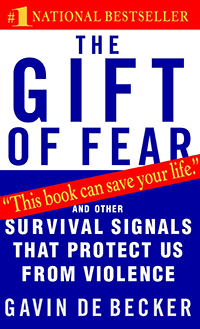
That’s a great, great example because there’s a book called Gift Of Fear by Gavin de Becker, one of the great books that covers this topic. When he says be cautious of the volunteered help, especially after you said no to it once, someone that is persistent with wanting to help you, carry your grocery bags, help you with something and you’re not asking for that help, that is a big warning sign. You wanna politely say no or just tell them no the first time, the second time you need to say it louder and just start moving in the opposite direction.
Or have that personal alarm and hit the button or whatever, right?
Exactly.
This personal alarm, it something that hangs on your keychain, or is it something that hangs around your neck? I haven’t seen these devices before.
You want something that is compact, that’s easy to carry. The one that is most popular that we make by SABRE is like the size of a thumb drive. It’s small but it’s 110 decibels, you can hear it up to 600, feet it’s the length of two football fields and you can attach that to your keys, you can attach it to your handbag, students can attach it to their book bag. We also make a product that will attach to your wrist for runners and has a reflective logo on it so people can see you at night, you simply pull the ring. They’re reusable, you put the ring back in place after and you can use it again. They’re battery operated so when the battery wears down you can get a new battery tested, make sure it’s functioning properly. That’s it, you strap it around your wrist, it’s right there, you are able to sound that and call for help immediately.
Any other books that you recommend besides Gift of Fear?
Gift Of Fear is probably my most favorite book actually. That is a great book, there’s College Safety 101. That is a good book, but those are probably, Gift Of Fear by far is my favorite book in this arena.
Any favorite apps for like iPhone or android?
I’m not a huge fan of apps. When it comes to personal safety at this point, I just think that if you have an app that can call 911, there’s several of them out there that do that. If that’s faster for you to have your phone unlocked and hit that button and that’s gonna call and give your whereabouts. I don’t know actually frankly any that do that. I do know of a product specifically that’s based in Chicago where I have my office called Guard Llama, it is a device where you hit the button and it calls immediately. You carry this with you, it’s very small, you put it on your keychain, keep it in your pocket, you press the button and it immediately will go to a monitoring center, gives them your location, lets them know that you’re in distress and they’ll call you and find out if they need to send the police. That is a good device but you just have a way to protect yourself, have a plan, if that makes sense for you then make it part of your plan and be prepared to use it.
Then what about tracking devices? Let’s say that your purse is stolen or your wallet or whatever, do you use any tracking devices to try and locate that?
Certainly, there are a lot of good options out there regarding that. It’s not my expertise per se but if you wanna use those certainly, there are several of them out there.
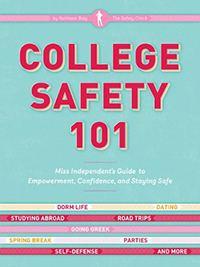
I use Tile and I also use Trackr. Both have apps that allow you to track it but you have to be within a certain range that is pretty small because it’s based on Bluetooth but if other people are running the app and your missing item has been picked up by their app then you’ll be notified as well. It’s not perfect but it’s better than nothing. I’ve not had a situation where anything was stolen and I had to try and track it down yet, but it’s certainly been helpful when I’ve misplaced my keys, my wallet, or whatever I’m trying to find in the condo. What other devices should we know about? How about some home security systems? What’s your take on that? Should everybody have one? What kind of system is the kind of system that you would recommend?
There are 25,000 crimes committed on home properties a day in the United States. I think it’s absolutely important, your home is one of your most prized possessions. It not only provides protection for your possessions but it protects yourself and your family as well. These home security systems are not very expensive these days. Certainly, you can go and do the ADT which is fantastic or the system that’s installed by a local installer. You can control these systems via apps on your iPhone when you’re away from home and there are a lot of good options as far as that’s concerned. If you want something that is inexpensive, easy to use, you can install yourself, there are several options like that that are available as well. We have a wireless home protection system at SABRE and stand-alone alarms as well too.
You can protect the front door of your home and start giving your home some basic levels of safety for well under $50 or you can go with the home security systems by ADT and these other systems that allow you to monitor from a distance and have monitoring systems as well that you can subscribe to for $50 to $60 a month. Bottomline is you want something, start somewhere, think about your vulnerable entries, research, this is not very difficult and provide some basic levels of security for your home. The smart thing to do also is get some stickers, get the home security sign, put it in your front yard. Put the basic security sign on your windows, I certainly encourage you to have the alarms back that up but that also will help, that may cause an intruder to see that and decide, “This home might be more challenging, I’m gonna skip over and go to the neighbors where they don’t have a home security system.”
Yeah, because a crime of opportunity is a lot easier for them than one that’s a lot of hard work.
That’s exactly right.
What would be some of the vulnerable entries, like obviously doors and windows? How do you determine what’s the vulnerable entry?
One of the big things I teach is that your windows, your front windows of your home, and back windows as well. They should be visible from the streets or from the alley behind your home. If not, if you have shrubs and trees covering your front windows, that’s a perfect opportunity, that’s something that these intruders, burglars look for because they can hide behind that brush between the brush and the house out of vision people walking up and down the street, driving down the street, your neighbors and take all the time they need to get inside your homes. We wanna make sure the windows are visible. The same thing goes for convenience stores, I always teach people when you’re going to convenience stores or something like that, you wanna shop at stores where you can see the register from the parking lot.
Those type of convenience stores are much less likely to be burglarized, to have an armed robber go into those type of locations than the ones where the windows are covered with posters, are boarded up and you cannot see inside. That’s a big piece of advice that I give. If you have a dog, having a dog out front, or a sign or something along those lines that’s something they definitely don’t like to encounter when they’re trying to make an intrusion or rob a home. We make a product called TV Light Simulator Fake TV that comes on a half-hour before dusk, a half-hour before sunrise. It simulates a TV turning on and off while it’s on and makes it look like you’re at home and you can set that up so it comes on everyday while you’re traveling. There are other things like making sure you move your car and having neighbors come and take your mail, things to that nature, obvious stuff that everyone knows but you wanna make sure you remember to do it.
Yeah, it’s so important. One of my family members, actually on my stepmom’s side, she had to go in the hospital, and unfortunately, she got burgled while she was there because the house was obviously left unattended. That’s the problem with elderly people who have some sort of medical procedure, they’re in the hospital for a few weeks or whatever and then they come back and they’re trying to recover from some horrible surgery or whatever and then they walk into a disaster area of their most private space having been totally decimated, it’s heart-wrenching.
Yeah, absolutely. You also wanna be cautious of the person that comes to your door and acts as if they’re with the utility company or some sort of service company and there’s no meeting schedule or there is nothing indicated that this individual is going to come to your place that day and they wanna make an entry to check on something. They may be casing your home or they may be trying to make a quick theft while they’re inside there, perhaps while you’re inside the other room. Never let those people inside. That’s your home or place of business, people pose themselves as other individuals so they can get inside and find out what it is that you have to offer and how easy it will be to commit the crime.
It’s good to get to know your neighbors.
Right. Somebody, a burglar, or whatever carrying a clipboard, they fool a lot of people or having a uniform that they bought from somewhere makes you think that they’re official but, they’re just casing the place. What other social engineering techniques should we be on the lookout for besides the person with the clipboard or whatever?
I just think that you wanna look out for one another, for your neighbors, for things that are out of the ordinary, and about those people who have access to your home. I think that’s what’s most common. It’s good to get to know your neighbors. When your neighbors move in, you know that people that are across the hall from you perhaps in your office space, get to know them. When they see something happening that doesn’t seem right, they can call you and get in touch with you and ask or call the local authorities because you’re not always gonna be there and if other people are there looking out for things that are out of the ordinary, that also goes a long way to protecting yourself, protecting your possessions and keeping things in order. Definitely, that is a piece of advice that I give everyone.
Our neighborhood had a watch group and people know in the neighborhood when you’re gonna be out of town so that they can look out for you.
Yes, it’s like living in a high-rise building in a major city and having a doorman. When you get to know your neighbors and you’re looking out for one another, it’s like having that doorman standing outside your apartment or your home and is there to keep things, make sure everything’s safe. Those people, you go into a high rise building in a major city and they have to be buzzed upstairs, they can’t get by that doorman. All sorts of deliveries and those things need to be scheduled in advance. When you’re looking out for one another, you give that extra layer of security that goes a long way to keeping things safe.
Speaking of deliveries, that’s another way that a potential attacker or a thief gets past your normal defenses. If they look like they’re a delivery person delivering a UPS package or Amazon or something and they’re not a good person.
100%. With the popularity of eCommerce and people buying things online, that only increases and becomes more and more common play. You definitely wanna keep your guard up when you’re engaging those individuals. It’s okay to read boxes on the front porch if you don’t feel comfortable opening that door. If you see someone ringing your neighbor’s doorbell or looking into windows, going along the side of your home towards the back, that’s definitely a red flag, contact the police.
Speaking of Amazon and e-commerce and stuff, there’s also social engineering that happens via the internet, via phone calls, they’ll try and get your passwords or credit card numbers or whatever by trying to fool you when they call you or when they send you e-mails. What are some of the scams that people should be on the lookout for?
The emails that are sent, and they’re sent from ma********@***il.com. It usually would be the person’s name then @mastercard.com or the bank name would come after the @ symbol. Before you respond to that email, it’s best to pick up the phone and call your bank, call your credit card company, call your utility provider, whomever it might be before you start volunteering personal information via email. When they call you and they’re asking you for your password when you’re calling them and making sure you prove you are, you’re dialing their number, then it’s safer to give that information. People try to threaten you, they try to throw you off your game, try to get you to panic, they leave voicemails now. Something about collecting a debt or some sort of lawsuit, the government is coming after you and it causes people to panic a little bit, they wanna solve the problem. They start volunteering personal data. The next thing you know, identity theft or some sort of theft occurs afterward. Be skeptical of those things.
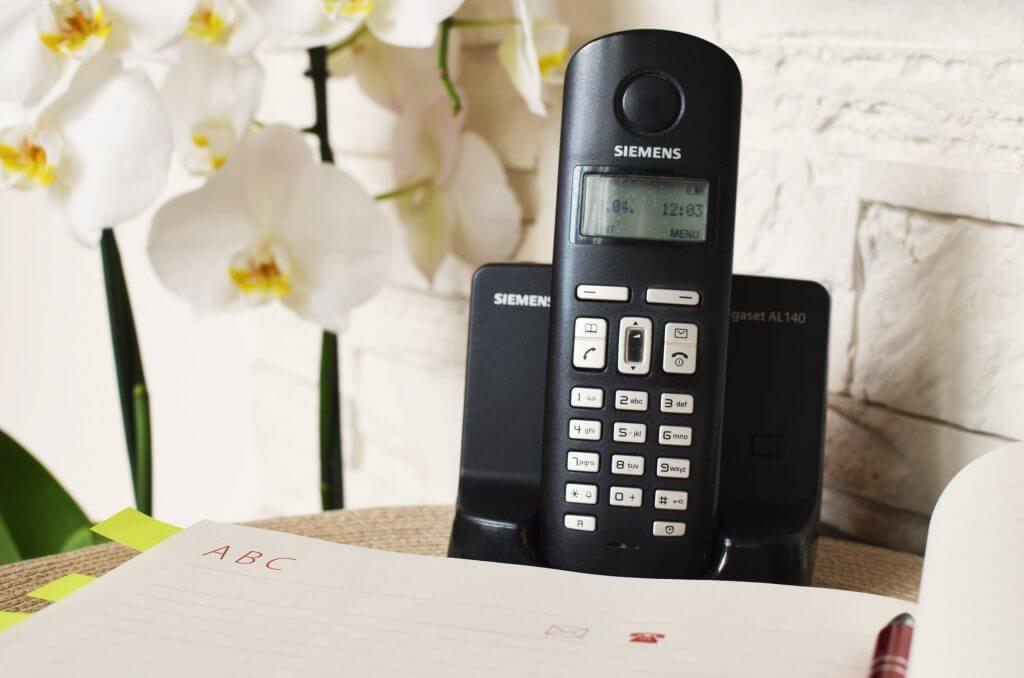
I read recently about the scam where they call you and play really heavy-handed with you and basically accuse you of an IRS fraud type situation where you need you pay the IRS immediately and you have to pay them now. They’ll only take gift cards as payment. The IRS is calling me demanding a gift card as payment. That sounds legit. Let me go and take care of that right now.
When they leave that phone number for you to call back, Google that phone number and nine out of ten times it’s gonna come up and say it’s some sort of scam. Just delete the number and move on about your day. Be highly skeptical of any phone calls or emails you receive.
If somebody is coming to your door and they want to gain entry so that they can deliver a package for you and your gut’s telling you no, if somebody is calling you and your gut’s telling you something is not quite right, they’re asking for your personal information or whatever, tell them, “If you’re from Bank of America or whatever, I’m just going to call back, I’ll call Bank of America myself and I’ll give you the information.” Of course, if they’re fakers, that’s not gonna be something that they’re gonna be happy with. My aunt was a victim of a scam where she got an email, it was a fake email but it sounded like it could’ve been legitimate, that was supposedly from a friend in London who was stranded and didn’t have her passport, couldn’t leave the country, had her money stolen and she needed some money wired to her via Western Union.
Of course, it wasn’t actually her, it was a scam out of Nigeria or whatever but she ended up wiring several thousand dollars without calling her friend to see if it’s a real thing, she just trusted the email. When she did talk to her friend it’s like, “I haven’t been to Europe in ages, I would’ve called you and spoken to you, I wouldn’t have sent you an email. I wouldn’t even have asked you for that anyway.” Just be skeptical I think is key. Have you heard about these fake kidnappings going on where somebody calls and says, “I’ve got your daughter, your son,” or whatever? I nabbed them from their walk home from school or whatever and I’m gonna kill them if you don’t wire me money within this time period. But then, they don’t think to call the school or their kid and find out that the kid is actually safe and fine, and that’s completely fake. Have you heard about this?
I’ve not heard about that one, no. I’ve certainly heard the ones where you’re traveling internationally and the actual kidnapping is very real. In those situations, often times the families will send the money and they still end up killing the individual they kidnap. One of the pieces of advice that I’ve given to law enforcement is never going to that next location. If someone is trying to actually physically grab you and kidnap you, do everything you can to get out of that situation. If they’re gonna take you to point B, there’s a very good chance that the situation’s gonna be lethal and it’s never something that you wanna do. But no, the situation you’re actually discussing, I’m not familiar with, I’ve not heard of.
Alright, that was a really important point. If somebody’s trying to pull you into the car, resist with every ounce of your strength because if they do manage to change location with you, you are probably gonna end up dead.
The basic plan is to fight and do everything you possibly can to escape that situation.
That’s what the authority say and statistics show that. That is the basic plan is to fight and do everything you possibly can to escape that situation.
What if you end up getting put into a trunk, is there a way to escape from the trunk of a car?
I’ve read about situations where people have been able to break through the taillights and take their hand and wave to people to let people know they’re back there. Certainly, if you see a hand coming out of a truck, I think that as a responsible citizen, the number one thing you can immediately is call 911, give your location, and give the license plate number and description of that car. That’s the absolute smartest thing that you can do. We do have smartphones, there’s a situation not too long ago and I don’t know the full details. About this past summer, I think an individual was kidnapped at a rest stop and they were on the phone with the local police or the highway patrol and even their spouse and they eventually ended up finding the dead body, the person was murdered.
You do have your phone on you and if you can articulate where you were at when you were kidnapped and any sort of description that you can give, obviously do that right away as well too but that is a bad situation to be in. Having that safety plan that we talked about at the beginning of the conversation, keeping that distance, and trusting your gut will go a long way towards keeping you out of that situation and having a way to protect yourself. Whatever it is that you choose, you may choose a personal alarm, you may choose of SABRE pepper spray, you may even choose a firearm, have something, have a plan and have a way to protect yourself, know how to use that product, practice with it and be prepared on that situation. You make yourself a hard target, you practice that condition yellow relaxed alertness, you have that safety product with you, that’s gonna go a long, long way to keeping yourself and your family safe. You may find that you’ll never be in that situation to have to use it but it was the best investment you ever made.
It’s all great advice, this is fantastic advice. Listeners, we’re gonna put a checklist together of all the recommendations from David into the checklist. Go to getyourselfoptimized.com. Also, if there are any videos that David, you’d recommend people to watch of you explaining some personal safety tips, you’ve been on TV quite a lot, is there one in particular that you would recommend everybody to watch?
You can go to personalsafetyexpert.com, there’s a number of videos, there are blogs, there’s a lot of safety tips and advice that’s given there. I also wanted to mention that College Safety 101 that’s by Kathleen Baty, she’s the safety chick colleague of mine, we’ve worked together in the past, we’ve done The Today Show. She’s actually on the today show regularly, I’ve been there with her, she’s a good advocate as well too, focuses a lot on safety of college students. That’s Kathleen Baty, College Safety 101 is her book. There’s a personalsafetyexpert.com, there’s a lot of videos and safety tips, sabrered.com for the actual products that you can protect yourself and your family with.
Thank you so much, David, for sharing your wisdom and experience and all these great tips. Hopefully, we’ve saved a life here today. Thank you again and thank you, listeners. Go to getyourselfoptimized.com for all the contents and links so forth. This is Stephan Spencer signing off, we’ll catch you on the next episode of Get Yourself Optimized.
Important Links
- Twitter – David Nance
- LinkedIn – David Nance
- Personal Safety Expert
- Facebook – Personal Safety Expert
- SABRE
- SABRE Personal Safety Academy

